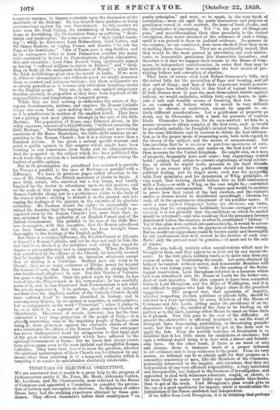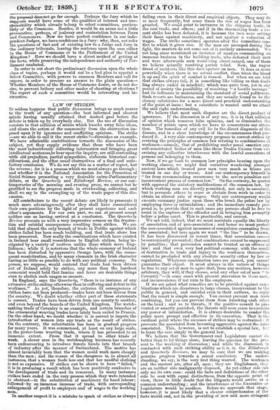TRIBUNALS ON ELECTORAL CORRUPTION.
Wn are oonvinoed that it would be a great help to the progress of Parliamentary purity if Mr. Price, Mr. Monk, Alderman Carden, Mr. Leathern, and Mr. Charlesworth, were returned to the House of Commons and appointed. a Committee to consider the preven- tion of bribery and corruption: at elections. No,Members of either House have had the striking experience obtained by those gen- tlemen. They offered themselves before their countrymen " on. purity principles," and were, so to speak, in the very thick of corruption,—were all amid the p discussions and projects of gentlemen versed in such matters, the issue of bank checks, and the vicissitudes of canvassing. Yet " to the pure all things are pure," and notwithstanding their close proximity to the foulest corruption, they never dreamed of the existence of such a thing, until it was proved to them on judicial evidence. No persons in the country, we are convinced, were more shocked than they were at making these discoveries. They are so profoundly moved, that they would'be the most earnest in preventing any such misfor- tunes to honourable gentlemen like themselves hereafter ; and therefore is it that we suggest their return. to the House of Com- mons, by independent constituencies, in order that they may-he appointed at a special time to reconsider the best means of pre- venting bribery and corruption at election.
the have of course read Lord Robert Grosvenor's bills, and
the recent bills for the prevention of flags- and treating, and all that sort of thing ; and men of their experience would perceive at a glance how utterly futile is this kind of topical treatment. If both Houses were to pass the most tremendous statute against bribery, we would undertake, within forty-eight hours, to indi- cate a safe and. feasible means of breating that law. Here is an example of bribery whioh it would.: be very difficult indeed to obviate or counteract, except by appeals to en- tirely different considerations. Let a gentleman of property go down, say to Gloucester, with a taste for pursuits of various kinds. Gloucester is famous for its corn-market: let him be a person anxious to obtain samples of the best corn, such as would be peculiarly suitable for Dauglish's aerated. bread. Let him also in the same dilettante zeal be anxious to obtain the. best informa- tion as to the proper mode of measuring corn, both with regard-to the theory of the subject, and the means of measurement. Let him proclaim that he is anxious to purchase specimens of corn, specimens of corn measures, and essays. on- the best kind of uni- form measure for the United: Kingdom. He might also, as a man of property, frequently have new coats-; buy engravings second
hand-; employ local artists to execute engravings of local celebri- ties, of which he would make presents to his local friends.
There is no reason why, the gentleman should-not have strong
political feeling, and he might avow, such was his sympathy with Tory principles and his detestation of Whig principles, or vice versa, that nothing should. induce him to hold intercourse with a Tory,—or with a."Whig, as the case might be,--oonvieted of the detestable contamination. Of course men would be anxious to prove how they voted at the last electiononul the.visitor's smiles or frowns would be distributed accordingly ; likewise his cash, all in the spontaneous enjoyment of his peculiar tastes, If such a man visited Gloucester before the elections, say twice, avowing that his sympathies. habitually become stronger at every election, is it not probable that the candidate on which he smiled would be returned ?—and. who .could say. that the peouniar,y favours distributed before the election, or after iteeonstithied " bribery " Yet if this plan, were carried out syetematieelly, it would be as cen- tain, or nearly asncertain, as the payment of direct fees for voting. But no doubt our suggestions could be beaten easily and thoroughly by any professional men well versed in the devices of such con- flicts; only the pretext must be genuine,—it must not be the sale of straws.
.There are, indeed, entirely other considerations which may be brought to bear, and. they appear to us to be not by any means ob- scure. In the first place, nothing tends so to deter men from any oourse of action as frustrating the result. Let seat& obtained by bribery be vacated without mercy, and honourable Members wilt find it a very losing game to bribe. At the meeting of the Socio- logical Association, Lord Brougham. referred ton measure which had been introduced into the House of Lords for the better con- duct of such inquiries. The plan appears to have been concerted betweeh Lord Brougham and the Duke of Wellington, and it is not difficult to suppose who had the larger share in the practical. suggestion. The proposal was, that questions of inquiry, whether respecting election petitions or private bills, should.be referred to a Jury consisting of seven Members of the House of Commons and five Lords, sitting under the presidency of an in- dependent Judge ; the verdict of the Jury to be binding on all parties as to the facts, leaving-either House to enact on those facts
as it pleased. Now this goes to the root of the difficulty. At present the obstructive to effectual treatment- is not the want of stringent laws, denouncing, prohibiting, or threatening punish.: ment, but the want of a machinery to get at the facts and to apply the law. Even the terrible sentence of frustration is so doubtful that it has little alarm for candidates at elections; but such a tribunal would bring it to bear with a direct and formid- able force. On the other hand,. if there is no want of acts and clauses, there is immense want of a. proper tribunal. to sift evidence and to keep witnesses to the point. From its very nature, no tribunal can be so utterly unfit for that purpose as a committee consisting of men, like the Members of the Commons, personally interested in the inquiry, and conscious that they are independent of any very effectual' responsibility. A Jury interested. and irresponsible, not trained to the business of investigation, and appointed to deal with witnesses reluctant, stupid, or. clever is far more likely to make very bulky and. unreadable blue-books, than to get at the truth. Lo'rd Brougham's plan would give us the use of a good. machinery for inquiry, while it would retain the jurisdiction of the House unabated. and independent.
If we differ from Lord Brougham, it is in thinking that perhaps
the proposal' does not go far enough. Perhaps the Jury which he- suggests would have some of the qualities of interest and irre- sponsibility which already belong to select committees, particu- larly of the Commons. Besides; it would be an arena not a little provocative, perhaps, of jealousy and contestation between Peers and Commoners. Now we have perfect confidence in our inde- pendent Judges, wehave confidence in a Jury : why, then, not refer the questions of fact and of existing law to a Judge and Jury in the ordinary tribunals, leaving the. sentence upon the case either to the House of Commons, or- to the Parliament of the United Kingdom ? Here we should, have a direct method of getting at the facts, while preserving the independence and authority of Par- liament unabated.
In order to cut short the preliminary discussion upon the whole class of topics, perhaps it would not be a bad plan to appoint a Select Committee, with powers to summon Members and call for papers, in order to procure an answer to the plain question— W hether Members of the House of Commons desire, or do not de- sire, to prevent bribery and other modes of cheating at elections ?- The report of such' a. committee would be interesting and in- structive.



























 Previous page
Previous page